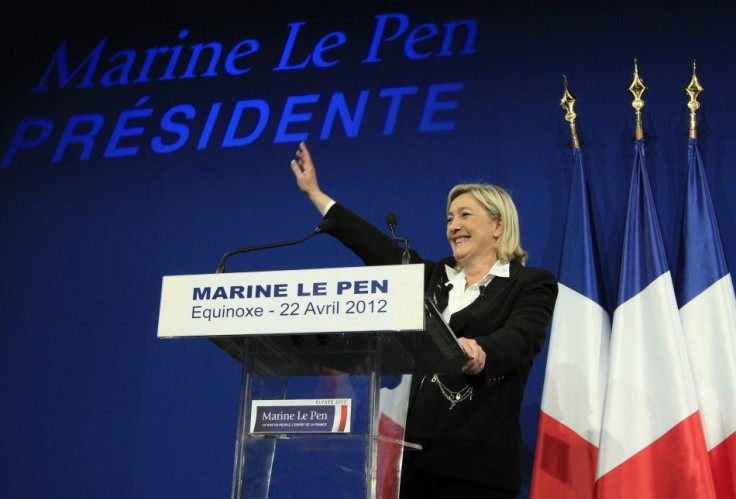In French Elections, Le Pen Voters To Make Or Break Hollande

The French presidential election's first round has left Socialist candidate Francois Hollande leading the race, incumbent President Nicolas Sarkozy on the defensive, and Marine Le Pen as the inherent arbiter.
Falling behind Hollande's 28.6 percent tally, Sarkozy is the first president in France's modern history to lose the first round of his re-election campaign, coming up short with 27.1 percent.
Le Pen, on the other hand, scored a record-high of 17.9 percent, the most votes her extreme right-wing National Front party has ever gained. This would appear to have made her a new kind of kingmaker.
In the 2007 election, her father and founder of the party, Jean-Marie Le Pen, gained 10.4 percent of the vote.
Now, Marine Le Pen's refusal to endorse either Hollande or Sarkozy places them in an awkward duel for the NF's votes until the second round of the election on May 6.
We have blown apart the monopoly of the two parties of banking, finance and multinationals. Nothing will ever be the same, said Le Pen,, as quoted by Bloomberg Businessweek.
Any appeal by Hollande to NF voters must be extremely delicate. The favored Socialist candidate would be reaching out to voters who, in voting for Le Pen, endorsed abandoning the euro currency and severely restricting immigration.
In an interview with the left-leaning newspaper Liberation, Hollande detailed his strategy, saying he would bring back NF voters who in fact belong to the left but voted with the extreme right out of social anger and anti-Sarkozy sentiment. Indeed, many Le Pen supporters might endorse Hollande's anti-EU and pro-jobs message.
The situation in France is somewhat similar to British elections where supporters of the extreme right-wing, anti-immigration British National Party are, in many cases, disaffected Labour Party supporters. Many in the BNP would find supporting the Conservative Party an anathema.
Nonetheless, Le Pen considers Sarkozy and Hollande identical on the most significant issues, notably France's sovereignty.
Moreover, she has refused the role of political arbiter, claiming that her voters know what they want, listing protectionism, zero immigration, a security revival, prioritization of employment and housing.
It is the French who are the arbiters, Le Pen said, according to Le Nouvel Observateur.
Acknowledging the NF voters' frustration, Sarkozy addressed them: You are feeling afraid. I have heard you.
But despite such comforting words, Sarkozy will still struggle to win over NF voters given Le Pen's rhetoric against him and call for abstention of the second round.
The high turnout for the National Front should have been good news for Nicolas Sarkozy. However, it appears that Marine Le Pen seeks to destroy Sarkozy's Union for a Popular Movement party. She did not call for her voters to support Sarkozy but instead to abstain, knowing that such abstention would lead to Sarkozy's defeat, explained Douglas Yates, professor of political science at the American Graduate School in Paris and the American University of Paris.
Indeed, as Le Pen leaves Hollande and Sarkozy scrambling for her 6.4 million votes, she turns the National Front's attention to the June parliamentary elections.
As of now the NF has no members of parliament present in the National Assembly; in 1986 it had 35.
© Copyright IBTimes 2024. All rights reserved.




















